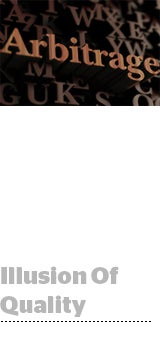Here’s today’s AdExchanger.com news round-up… Want it by email? Sign up here.
Upselling
Ad arbitrage – buying web traffic and then selling that inventory on a website for more than it was originally paid for – is universally decried but is also still a lucrative strategy. The enterprise data software company DeepSee published a report showing how many arbitrage sites differ their content display when it comes to accessing websites from a paid link versus a direct link. Direct visitors, for example, would see a single-page format with no ads above the fold (an indicator of quality content). Meanwhile, those clicking to the same page via a paid link may see a busy slideshow format that loads and reloads the page, often with many ad spots stuffed above the fold. Scammers do this to avoid the ire of SSPs, which may have policies against the “hyper-active” version of the sites. But SSPs have employees who vet publishers themselves (i.e., they visit the site directly, seeing the pristine version). “This gives the illusion of quality, while the most clicked links are actually stuffed to the gills with ad units that refresh aggressively,” the report states.
Deep Pocket
Automattic, best-known as the owner of WordPress, announced that it acquired the podcasting app Pocket Casts. NPR, the majority owner of Pocket Casts since 2018, had been shopping the app since January, The Verge reports. Automattic hasn‘t elaborated on how it plans to flip Pocket Casts from a loss-making business. (The app reportedly cost NPR $800,000 last year.) But Automattic has powerful distribution channels and can stomach a short-term loss better than NPR. Automattic’s WordPress is the go-to content management system for the web, and the company is prioritizing new content creation channels, such as streaming audio and mobile apps. Aside from the deal for Pocket Casts last week, Automattic acquired the journaling app Day One one month ago. There was also the flea market pickup of Tumblr in 2019 for a cool $3 million. Automattic raised $300 million in late 2019 from Salesforce Ventures, the company’s VC arm, so it may have some ammunition left.
The Customer Kickback
Amazon introduced a new advertising referral program that gives bonuses to brands that run campaigns off of Amazon that drive sales back to the Amazon site. On average, the bonuses are worth about 10% of the sales driven by off-Amazon advertisements, according to the Amazon Seller Central blog post. In some ways, this is a natural next step in the evolution of Amazon’s referral program. They cut out third-party affiliate vendors last year, preferring the network of direct referral programs with publishers. Now, Amazon is offering similar commissions for sellers that use its ad platform. It is also worth noting that one benefit of the Amazon DSP is that brands can use Amazon shopper data to target across the web without selling on Amazon. Finance, insurance or automotive companies have no business on Amazon, but often advertisers are choosing between their own ecommerce site and an Amazon storefront. This bonus is meant to incentivize those advertisers to return traffic back to Amazon.
But Wait, There’s More!
Catalyst and Xaxis released an omnichannel research report.
California Attorney General Rob Bonta is cracking down on companies not abiding by the state’s Global Privacy Control tool. [Digiday]
The White House said Facebook continues to drop the ball on its handling of misinformation. [Business Insider]
Civil rights groups are lobbying lawmakers to “clean up” Facebook. [Bloomberg]
Juul’s $40 million settlement in North Carolina for allegedly targeting underage consumers could change how e-cigarettes are marketed. [The Drum]
You’re Hired
The IAB Tech Lab hired Anthony Katsur as its new CEO. [WSJ]
WarnerMedia Ad Sales appointed Laura Dames as EVP, marketing, and Andrea Zapata as head of research, data and insight. [release]
Omnicom named Karen van Bergen chief environmental sustainability officer. [CampaignUS]












